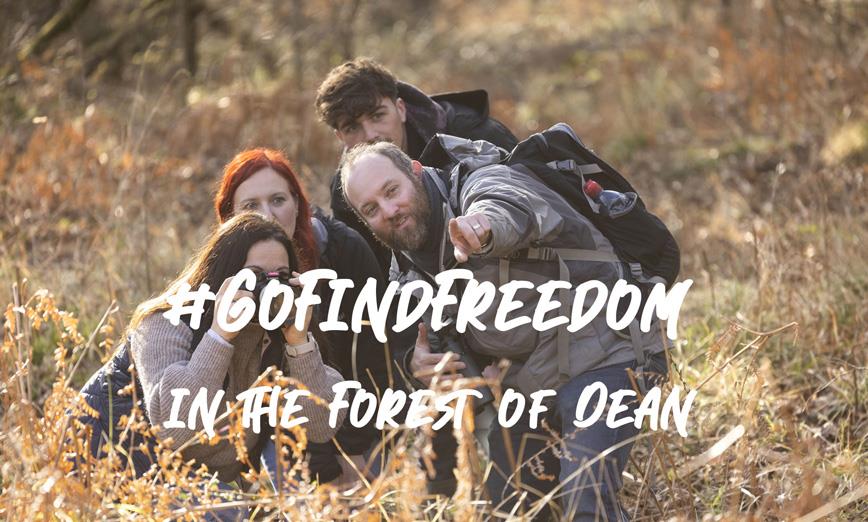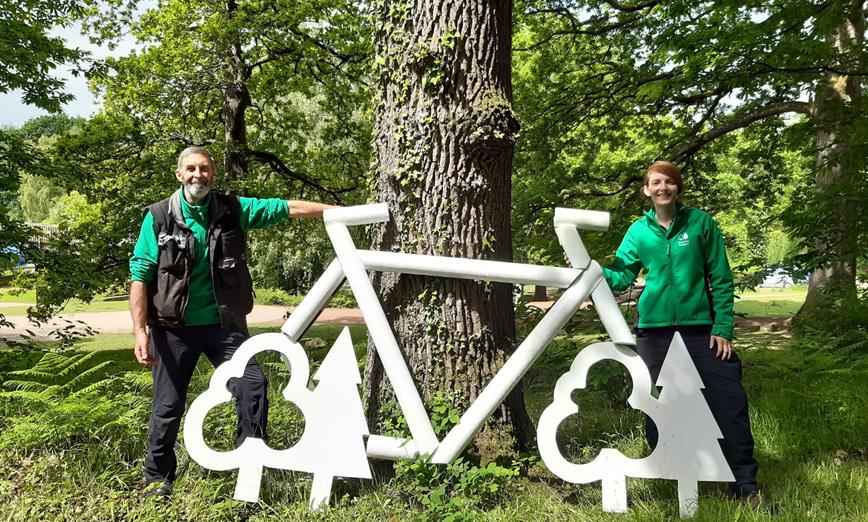- Stay
- What's On
- Things To Do
- Food & Drink
- Explore
- Inspiration
- Offers
- Weddings
- Blog
My Planner
- Stay
- What's On
- Things To Do
- Food & Drink
- Explore
- Inspiration
- Offers
- Weddings
- Blog
You are here: Explore > Towns & Villages > Forest of Dean > Village Life: Whitecroft
Whitecroft is a small village in the Forest of Dean, known as Dabdown to its locals, who are nicknamed ‘The Greeks’. Over 1,400 people a day used to visit Whitecroft to work, shop or play. Industry thrived and champion rugby, football and cricket teams won accolades. A highly regarded male voice choir provided entertainment and shops provided retail therapy selling everything from buttons to batteries and meat to millinery. At one time, there were four sweet shops rotting the village children’s teeth. But what was village life like?
Geoffrey ‘Gruffy’ Aldridge was elected High Sheriff of Whitecroft in 1952 and Lord Mayor in 1973. Here he writes about living in Dabdown and its changes over his lifetime. Sadly Gruffy died in March 2020 in his 100th year.
 A Few Words From Geoffrey ‘Gruffy’ Aldridge ‘Lord Mayor of The Ancient Citie of Whitecroft’
A Few Words From Geoffrey ‘Gruffy’ Aldridge ‘Lord Mayor of The Ancient Citie of Whitecroft’
When I was born in Whitecroft in 1920, the village was powered by oil lamps and candles, water was supplied via a series of wells, and horses tended to transport goods and people unless the train was going your way.
My parents were from the other side of the Severn – Berkeley – where my father, Clifton, was a miller. In 1914 father heard Lord Bledisloe was advertising for a manager for Lydney Farmers Stores, so he applied and was offered the job.
Their Forest of Dean life started in Blakeney in a small house where my brother Ron was born. The move to Whitecroft Mill was purely due to the tragic death of the miller, Hubert Morse in 1912, which resulted in Lydney Farmers buying the property and offering father the opportunity of running the Mill.
By 1923 there were five Aldridge children ably supported by mother Hilda, and father, who was by now Managing Director of Lydney Farmers. Father had closed the Mill a few years earlier, moving the operation to Lydney but to this day the workings are still present, rusting away in the building next to my home here in Whitecroft.
We lived a happy, fulfilled and, some would say, privileged family life at the Mill, surrounded by a village that was full of energy and community spirit.
At the bottom of our garden father built a tennis court, which saw many games played with friends and neighbours and during WW2 entertained the local Land Girls and Timber Jills. My brothers (Ron, Derrick and Alan) and I were no different to other boys of our age, getting into scrapes, scrumping, being cheeky, and with our sister, Marjorie, we would join in the carnivals and other entertainments the village put on.
Attached to the Mill was three acres of grazing land plus an extra three that father rented. On this land, we kept two or four cows. We were not serious farmers but I was in charge of looking after the animals and milking them in the mornings, by hand. I would then deliver the milk on my way to school! I loved helping with haymaking in the summer, building haystacks – all done by hand of course! Even when I started work at Lydney Farmers, I would still do the milking and delivery and help with the pigs and hens. My son Rob started helping with the milking when he was a small boy though by then we had machines to do it, a necessity because we had increased the herd to twenty-five cows. Milk was still put into churns to be collected though.
I was brought up a Methodist and attended Sunday School at the Wesleyan Chapel, and the yearly outings for us children to Severn Beach, a seaside resort back in the day with a swimming pool and boating lake, were happy times. Brother Ron started the youth club before the war at the chapel and a plaque was sited there by father in remembrance of brother Alan who died at Arnhem in 1942 (now in the Memorial Hall where a wreath of poppies is laid every Remembrance Sunday).
My father Clifton was President of Whitecroft and District Male Voice Choir and as I apparently had a good voice, I was sent for singing lessons though when my voice broke I gave it up. However, in later life I could be found in the pub participating in a merry refrain with wife Jean accompanying me on the piano.
We had electricity and mains water connected in the 1930s. Before that, we had to see with the aid of hurricane lamps and candles and would have to collect water from the well or mill stream. We were one of the first houses to have a telephone – Parkend 19. You would have to ask Parkend exchange to connect you to the number you required before Whitecroft exchange was built next to the Memorial Hall.
 WW2 didn’t affect the family immediately. I joined the Home Guard, Derrick joined the RAF and Marjorie was called up and worked at the American Army Signal Corps in Cheltenham. Alan then joined the RAF but, at the age of twenty, was shot down at Arnhem and is buried at Oosterbeek, in The Netherlands. In 1942, I enlisted despite being in a reserved occupation and joined the Royal Navy. I got to see the world! I worked on Arctic convoys and then went out to the Far East (becoming part of ‘The Forgotten Army’) and spent quite some time in Australia, but by 1946 the call of Whitecroft was too strong and so I returned home and immediately was helping with haymaking as if I had never been away!
WW2 didn’t affect the family immediately. I joined the Home Guard, Derrick joined the RAF and Marjorie was called up and worked at the American Army Signal Corps in Cheltenham. Alan then joined the RAF but, at the age of twenty, was shot down at Arnhem and is buried at Oosterbeek, in The Netherlands. In 1942, I enlisted despite being in a reserved occupation and joined the Royal Navy. I got to see the world! I worked on Arctic convoys and then went out to the Far East (becoming part of ‘The Forgotten Army’) and spent quite some time in Australia, but by 1946 the call of Whitecroft was too strong and so I returned home and immediately was helping with haymaking as if I had never been away!
My father extended his farming empire and bought 98 acres and two farmhouses near Blakeney. Derrick and I worked the new farm, cycling there and back every day. Eventually Derrick moved in to the farm with his new wife Barbara. In 1948 father bought Turn Out farm from the National Coal Board where we raised cattle and pigs. I worked there and though the work was hard I enjoyed the life and when father died, I took it over.
I met Jean in 1949 when she was playing piano at the Miners and we married in 1960 and moved into the Terrace, on Parkhill, above the fish and chip shack. We had three children, Jayne, Polly and Rob and, after my mother died, we moved into the Mill House and I have lived there ever since. Father had bought the Mill from Lydney Farmers some years earlier so with Turn Out farm life seemed to be settled. However, the dairy farm was not very profitable and so we turned our attention to beef cattle and by the 1980s we had a large herd that Rob tended, as I was in my 70s by then.
 Jean and I participated fully in village life, as did our children. I was elected ‘High Sheriff’ of Whitecroft in 1952 and then ‘Lord Mayor’ in 1973 and attended many charitable events, which helped raise funds for various organisations in the village. Along with Ted Hooper and Bill Harding, I started Whitecroft Football Club and saw it move to its new recreation ground in 1959. Jean and I socialised in the village’s three pubs (four if you count The Swan at Phipps Bottom) played skittles and with Jean at piano, often raised the roof with a good song. Life was good. We were even able to travel, with a trip on Concorde and a cruise on P & O’s Oriana.
Jean and I participated fully in village life, as did our children. I was elected ‘High Sheriff’ of Whitecroft in 1952 and then ‘Lord Mayor’ in 1973 and attended many charitable events, which helped raise funds for various organisations in the village. Along with Ted Hooper and Bill Harding, I started Whitecroft Football Club and saw it move to its new recreation ground in 1959. Jean and I socialised in the village’s three pubs (four if you count The Swan at Phipps Bottom) played skittles and with Jean at piano, often raised the roof with a good song. Life was good. We were even able to travel, with a trip on Concorde and a cruise on P & O’s Oriana.
The village thrived with its sixteen shops and three pubs but unhappily, times were to change for Whitecroft and me. Firstly as jobs disappeared in the village so did the shops until only the Post Office and Fish ‘n’ Chip Shop remained. The New Inn closed and eventually so did The Swan and then in 2012 we lost the Post Office as well.
Sadly, Jean died in 2006. Life isn’t the same anymore but I am well looked after by Rob and his family and Jayne and Polly are never too far away. I may not get about as much I used to but I am happy being close to home and though Whitecroft is a mere shadow of its former self – IT IS HOME, WHERE MY HEART IS!
Geoff ‘Gruffy’ Aldridge, ‘Lord Mayor of Whitecroft’
Taken from Welcome to 'Dabdown': The Story of Whitecroft in the Forest of Dean by Jenny Care, available from many of our local shops including the Dean Heritage Centre, Clearwell Caves and Taurus Crafts and online here.
All images © Geoff Aldridge Estate.
Postscript: The chain around Gruffy's neck is made from pennies discovered in a barn where a travelling shoeshine man named Charlie ‘The Shoeblack’ had spent his last days. Charlie was a much loved local figure, and although he died a pauper, the villagers of Whitecroft raised enough money for him to have a church funeral and locals carried his coffin into St Paul’s, Parkend for a full service. Gruffy always wore the chain as can be seen in the above photograph.

Explore Our Highlights

- 1Elton Giant Mazes and Activities Maze
- 2Bracelands Camping
- 3Symonds Yat Rock Lodge
- 4Oakwood Cottage
- 5Golf at Bells Hotel and Country Club
- 6NoLo Cocktails
- 7Arden's Farm
- 8Tudor Farmhouse Hotel
- 9Taurus Crafts Cafe
- 10Hopewell Colliery - Working Mine and Cafe
- 11Bracelands Campsite – Cosy glamping pods
- 12The Forest Larder
- 13Forest Of Dean & Wye Valley School Of Photography
- 14Wye Valley Butterfly Zoo
- 15Hereford Cathedral
- 16The Rookery Cottage
- 17River Wye Canoe Hire
- 18Pedalabikeaway
- 19Puzzlewood
- 20The Coach House - Newland
- 21The Dome Garden
- 22The Dairy at Gage Farm
- 23Adventure golf at Whitemead Forest Park
- 24The Roost Luxury Cabins

©Visit Dean Wye 2025. All Rights Reserved.
*Visit Dean Wye is the trading name of Forest of Dean & Wye Valley Tourism Limited.








